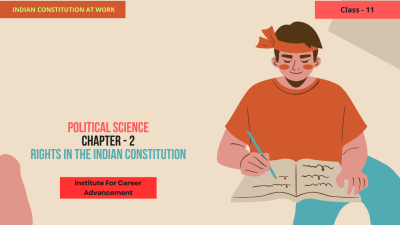Rights in the Indian Constitution - Class 11

₹299
Rights in the Indian Constitution is a Class 11 chapter that likely explores the fundamental rights guaranteed to Indian citizens under the Constitution. It might delve into topics such as: Fundamental Rights: The different categories of fundamental rights, including the right to equality, freedom, life and liberty, cultural and educational rights, and property rights. Constitutional Provisions: The specific provisions in the Constitution that guarantee these rights, such as Article 14 (equality before the law), Article 19 (freedom of speech and expression), and Article 21 (right to life and liberty). Limitations on Fundamental Rights: The circumstances under which fundamental rights can be restricted or suspended, such as in the interests of national security or public order. Enforcement of Fundamental Rights: The mechanisms for enforcing fundamental rights, including judicial review and the role of the Supreme Court. Significance of Fundamental Rights: The importance of fundamental rights in protecting individual liberties, promoting social justice, and ensuring the democratic character of the Indian state. Overall, this chapter likely provides a comprehensive overview of the fundamental rights guaranteed to Indian citizens under the Constitution, their significance, and the mechanisms for their enforcement. ভারতীয় সংবিধানের অধিকার হল একাদশ শ্রেণীর একটি অধ্যায় যা সম্ভবত সংবিধানের অধীনে ভারতীয় নাগরিকদের প্রদত্ত মৌলিক অধিকারগুলি অন্বেষণ করে। এটি নিম্নলিখিত বিষয়গুলি নিয়ে আলোচনা করতে পারেঃ মৌলিক অধিকারঃ সমতা, স্বাধীনতা, জীবন ও স্বাধীনতা, সাংস্কৃতিক ও শিক্ষাগত অধিকার এবং সম্পত্তির অধিকার সহ মৌলিক অধিকারের বিভিন্ন বিভাগ। সাংবিধানিক বিধানঃ সংবিধানের নির্দিষ্ট বিধানগুলি যা এই অধিকারগুলির নিশ্চয়তা দেয়, যেমন অনুচ্ছেদ 14 (আইনের সামনে সমতা) অনুচ্ছেদ 19 (বাক ও মত প্রকাশের স্বাধীনতা) এবং অনুচ্ছেদ 21 (জীবন ও স্বাধীনতার অধিকার) মৌলিক অধিকারের সীমাবদ্ধতা-যে পরিস্থিতিতে মৌলিক অধিকারগুলিকে সীমাবদ্ধ বা স্থগিত করা যেতে পারে, যেমন জাতীয় নিরাপত্তা বা জনশৃঙ্খলার স্বার্থে। মৌলিক অধিকারের প্রয়োগঃ বিচার বিভাগীয় পর্যালোচনা এবং সুপ্রিম কোর্টের ভূমিকা সহ মৌলিক অধিকার প্রয়োগের প্রক্রিয়া। মৌলিক অধিকারের গুরুত্বঃ ব্যক্তিগত স্বাধীনতা রক্ষা, সামাজিক ন্যায়বিচারের প্রচার এবং ভারতীয় রাষ্ট্রের গণতান্ত্রিক চরিত্র নিশ্চিত করার ক্ষেত্রে মৌলিক অধিকারের গুরুত্ব। সামগ্রিকভাবে, এই অধ্যায়টি সম্ভবত সংবিধানের অধীনে ভারতীয় নাগরিকদের যে মৌলিক অধিকারের নিশ্চয়তা দেওয়া হয়েছে, সেগুলির তাৎপর্য এবং সেগুলির প্রয়োগের প্রক্রিয়া সম্পর্কে একটি বিস্তৃত বিবরণ প্রদান করে।
Learn more
 0
0 